We’ll begin with a reign of terror. A few murders here and there. Murders of great men, murders of little men, just to show we make no distinction. We might even wreck a train or two. Just these fingers around a signalman’s throat, that’s all.
The Invisible Man is a classic, sandwiched between James Whale’s celebrated monster movies – Frankenstein and Bride of Frankenstein. The movie was renowned at the time for its special effects, which still hold up remarkably well on the snazzy new blu ray issued by Universal Pictures. However, the film itself is still fantastic on its own terms, featuring a great leading performance from Claude Rains, a witty script and some fantastic direction from Whale. I think it’s also quite wonderfully telling that The Invisible Man manages to feature the story of simultaneously the most human and the most inhuman of these Universal Monster Movies.
It’s fascinating how skilled Whale is at balancing the camp elements with the more sinister undertones. The eponymous character is, depending on the scene, a playful poltergeist or a murderous ghoul. His mind ravaged by the dangerous chemical passing through his veins, the lead character is erratic and unpredictable. In many respects that’s true of his motivations. Is he hoping to cure himself, or does he want to use his power to conquer the world, or is he simply causing death and destruction for his own entertainment? The film never seems to know, but that’s okay – because it seems like he’s never quite sure himself.
It’s this surreal ability to shift mood that makes The Invisible Man so fascinating, a movie that can go from ridiculously camp to bone-chillingly cold in the space of a single scene. Claude Rains is perfectly cast as Jack Griffin, his voice perfectly able to capture that inconsistency. One minute he seems quite lucid, in another he’s cold and calculating, and in the next he’s fully blown psychotic. returning to the car after causing a panic in an old inn, he jokingly asks if his companion heard the screams. “I had to take some exercise to keep warm,” he jokes. And then he gets serious. “I killed a stupid policeman. Smashed his head in.” It’s a hard enough transition to make for any actor, but Rains does it using only his voice, and without missing a beat.
Jack Griffin is the product of the work of several different people. Obviously, there’s Claude Rains’ sensational performance. It’s a wonderful irony that this was only the actor’s second film, and that it was his first talkie. Imagine having to deliver a role where you are mostly absent as your first spoken role, with your face only appearing briefly in the closing frames. Rains does, of course, provide a lot of the character’s movement and body language, but his voice work is so fantastic it’s tempting to simply focus on that.
James Whale is obviously the other party most responsible for Griffin’s success as a character. He cleverly frames shots as if he’s filming an actor, in such a way that the absence of a visible person at the centre of the shot is quite unnerving. It’s a fantastic trick, and one which toys a bit with the audience’s expectations. Whale knows enough about his audience view films that he can create a palpable and tangible absence, simply by filming the air as if an actor were moving through it. There are some lovely tracking shots that are probably among the easiest shots in the film, from a technical standpoint, but they contribute an impossible amount of atmosphere.
Credit must also, of course, be shared with the special effects team of John P. Fulton, John J. Mescall and Frank D. Williams, who brought the character to life. The special effects might look a little quaint today, but they still work astonishingly well. Indeed, in black-and-white, they look about as good as any similar effect attempted into the eighties. It’s all executed with such confidence and flair, with the little touches adding up to an impossibly impressive whole. That first shot of Griffin revealing his condition to the local residents is a fantastic sequence, and it looks as good on blu ray as it ever did.
The costume design for Griffin is uncredited, which is a massive shame. Even without knowing the character is actually transparent, the fiend is easily identifiable thanks to his snazzy wardrobe. Rains obviously can’t really express himself that well through physical tics when playing an invisible character, but Griffin’s wardrobe manages to say a lot about him almost immediately. It gives us the sense of superiority and arrogance and the flamboyance before he has even opened his mouth. I’d honestly argue that his outfit is an essential part of the Invisible Man’s identity, almost as much as Whale’s direction, Rains’ voice or the superb special effects work.
Part of what’s fascinating about The Invisible Man is that the lead character is probably the most monstrous in the Universal Horror canon. Dracula feeds to live. Frankenstein’s monster occasionally kills, but has a whole lot of excuses. Imhotep is willing to do terrible things for love, but an eternity as the living dead will do that. The Wolfman is driven by his compulsions. Gill-man just wants to be left alone… unless you’re a hot science babe. However, Jack Griffin is a complete and utter sociopath, despite the fact that he’s clearly the most human and grounded of the characters in the Universal canon.
To be fair, the drugs are undoubtedly having an effect on his psyche. It turns out that Griffin’s experimental serum had a secret ingredient – “made from a flower that’s grown in India”, recalling Opium from poppy in the Orient. Explaining that it causes insanity, Jack’s employer notes, “I only pray to God that Griffin hasn’t been meddling with this ghastly stuff.” It’s clearly having an effect on him, as he confesses to Kemp that he only had his more radical ideas about what to do with his gift after he took the drug. “It came to me suddenly. The drugs I took seemed to light up my brain.”
However, while the drug undoubtedly played a part in Jack’s psychosis – he does seems to get worse as the movie goes on – there are quite a few indications that he really wasn’t all that stable to begin with. His colleague Kemp describes the job their employer hired them to do at the lab, “Jack and I were employed to help him. That’s a plain, straightforward job. It’s not romantic, but it saves hundreds of deaths and stomach aches.” It’s mundane science work, but it’s altruistic and good. The implication is that it wasn’t enough to fulfil Griffin, even before he tried the dangerous substance.
Author H.G. Wells famously complained that the Griffin presented in the film was far too unstable, compared to his literary creation. Whale responded that “in the minds of rational people only a lunatic would want to make himself invisible anyway.” As in Bride of Frankenstein, Whale makes it clear that not all science is inherently evil. There is “good science” and “bad science.” Cranley and Kemp, in their efforts to cure world hunger, are doing “good science.” Even before his transformation, Griffin was working on “bad science.”
He at least possessed the same arrogant hubris as Victor (or Henry) Frankenstein. Trying to rationalise his research to Kemp, he admits, “Just a scientific experiment at first. That’s all. To do something no other man in the world had done.” That sort of pride would be enough to seal his fate in any other horror film, but it’s compounded by a few other factors. It’s interesting that Griffin’s motivation for his scientific work is far more developed than Frankenstein’s in Frankenstein, despite the fact the movie begins when his work is already over.
“Straightforward scientists have no need for barred doors and drawn blinds,” Kemp remarks, recounting his colleague’s secrecy and bolted cupboards and closets. Towards the end, in his mad lunatic phase, Griffin tries to rationalise his research to Flora, his fiancée. “I shall offer my secret to the world, with all its terrible power!” he boasts. “The nations of the world will bid for it – thousands, millions. The nation that wins my secret can sweep the world with invisible armies!”A serum that turns a person invisible is only liable to make a great deal of money if sold as a weapon of some description, making even Griffin’s earliest research seem almost sinister.
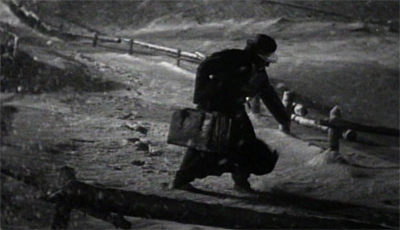
Yesterday, upon the stair, I met a man who wasn’t there, He wasn’t there again today, I wish, I wish he’d go away…
(As a sidenote, I’ve always found Hollywood’s fascination with mad scientists in the thirties as strangely prescient. Had The Invisible Man been produced a decade or so later, we’d be talking about Griffin’s research as a metaphor for the atomic bomb. After all, many of the scientists were driven insane by guilt – recalling Oppenheimer’s famous “I am become death” quote. It seems that Hollywood was a little ahead of the curve, and James Whale in particular seemed well ahead of his time.)
In many respects, the Invisible Man seems like a conscious inversion (or subversion) of the other iconic movie monster that Whale directed. Frankenstein’s monster was a genuine victim of a world that hated and feared him, and his acts of violence were genuine reactions to honest threats from people who simply didn’t understand him. He maintained a sense of pathos because he was subject to all the cruelty of the world, despite the fact that he never asked to be created. Jack Griffin feels like a conscious attempt to play with that idea, decades before it would become monster movie shorthand.
Jack Griffin did this to himself. His condition isn’t even an accident – he wanted it to turn out like this. There’s a slight hitch in that he can’t turn himself back, but he got exactly what he wanted. In justifying his acts of violence, he tries to portray himself as the victim. “You’ve brought it on yourselves,” he advises the town people. “Everything would have come right if you’d only left me alone. You’ve driven me near madness with your peering through the keyholes and gaping through the curtains. And now you’ll suffer for it!” It’s hardly an unbiased account of the situation.
Before he explains his planned reign of terror, he states that, “Everyone deserves the fate that’s coming to them.” Confessing the unfortunate incident in the Inn, he assures Kemp, “But the fools wouldn’t let me work in peace. I had to teach them a lesson.” This would be a justifiable position for Frankenstein’s monster to take. After all, he has suffered from an uncaring and cruel world. In contrast, the Inn allows Griffin to stay there long after his bill comes due. They only try to make his stay as comfortable as possible, and things begin to escalate when he lashes out. The violence comes from him. He’s not justified in reacting to some societal prejudice.
Griffin is presented as something of a genuine malcontent rather than a misunderstood freak, a Nietzschean ubermensch who commits all these fiendish acts simply because he can. Threatening his victims, he warns them, “You must be made to understand what I can do.” As he confesses to Flora, invisibility gives him complete power, and he seems to treat it as his right to exorcise that power. Whether it’s for silly tricks with bicycles or derailing a train, Griffin does these things because he can and because nobody can stop him.
Indeed, he only wears clothes because it makes the mere mortals around him more comfortable. “You’ll feel better if you can see me, won’t you?” he asks. Left to his own devices, Griffin is quite happy to parade around entirely naked, free of the constraints that society might impose by asking him to “cover up.” He is no longer bound by what society expects or demands of him, and – freed from those shackles – he is inherently destructive and violent. The Invisible Man is, like so many of these films, incredibly moral and socially conservative in its message.
(Indeed, it’s only divine intervention that stops Griffin, with unseasonal snow allowing the police to catch him by fluke. The movie accepts that Griffin is better than those characters around him, and is superior to his fellow man, but he still must be stopped. If the police can’t do it by themselves, nature itself will intervene on their behalf to put a stop to his unnatural actions.)
A lot has been made of James Whale’s homosexuality. The urge is to read that into his work, despite the protestations of many who knew him. I think it’s hard to avoid a gay reading of Bride of Frankenstein, but I’m less convinced by the attempts to read a gay subtext into The Invisible Man. To be fair, though, I must concede that there is a case to be made:
One can metaphorically read society’s invisible man as its homosexual man: effeminate, dangerous when naked, seeking a male partner in “crime,” tending to idolise his fiancée rather than love her, and becoming “visible” only when shot by the police, monitored by doctors, and heard regretting his sin against God (i.e., made into a statistic by the three primary forces oppressing queers: the law, the medical establishment, and religious orthodoxy).
However, I’m more inclined to read Griffin as sexually dysfunctional rather than inherently homosexual. The script adds a fiancée for the character, but Flora is conspicuously absent for large portions of the film. Unlike other films, The Invisible Man can’t even be bother with a romantic triangle to keep her occupied. It’s forty-five minutes into a seventy-minute film before Griffin and Flora interact.
Even then, she comes to him. Griffin doesn’t seem to think about her at all after his accident. He never mentions her name longingly, or keeps a photo or a locket when he runs away for his research. When she shows up at Kemp’s door, he seems to struggle for a moment to remember who she is. You could argue it’s the effects of the drug, but it hardly seems like an eternal love. “Why, yes, of course,” he remarks to himself. “How could I forget?” Imhotep and Dracula waited centuries. Frankenstein’s monster built a mate. Griffin can’t be bothered writing a letter to let her know he’s thinking of her.
Flora can’t help but feel strangely superfluous to everything. She’s absent from the climax of the story, but shows up at the end to hear his deathbed confession. Even then, he doesn’t utter “I love you.” Instead, he apologises for his reckless actions. When he meets with her, he tries to explain that he was motivated in his research by his love for her. However, his arguments all seem suspiciously self-centred, linked to his own sense of self worth:
Why did you do this?
For you, Flora.
For me?
Yes, for you, my darling. I wanted to do something tremendous, to achieve what men of science have dreamt of since the world began, to gain wealth and fame and honour, to write my name above the greatest scientists of all time. I was so pitifully poor. I had nothing to offer you, Flora. I was just a poor, struggling chemist.
We’re told that Griffin conducted his research in his room, implying that Flora was never there. I know that might have been tradition at the time, but it still seems fairly strange that she’s not even familiar with its contents. Instead of using his bedroom for sexual activity, he channels all that energy into his work.
The result is that when he finally casts off his clothes, he goes completely wild. It’s fascinating that none of Jack’s stunts seem to even suggest lust. I’m hardly expecting Hallow Man or anything, but Jack is breaking windows, knocking hats, robbing banks and derailing trains. There isn’t one moment that suggests any interest in anything vaguely sexual – whether heterosexual or homosexual. The closest thing to even a groping occurs when he throws the Innkeeper out of her seat, but that’s explicitly to announce his presence to the room. He does go immediately to his male friend’s house, but that’s only because he needs a lackey and figures that Kemp is easily managed. (That said, there is a hint of gay subtext when he threatens Kemp with nudity, “Do you want me to take these off?”)
However, while he doesn’t focus any of his energy into lust, he does seem quite fixated on strangling – which is a rather sexual act of violence. He could (and does) bludgeon his enemies, and it might be as effective to snap their necks, but Griffin seems to get strangely excited about the physical act of strangulation. “I’m strong and I’ll strangle you,” he warns Kemp. Forecasting his reign of terror, the fingers dance around an imaginary throat.
I don’t think that the Invisible Man is meant to be gay. I’ve always just figured that his violent outbursts were rooted in some deep-seated sexual dysfunction, or even his complete suppression of any expressly sexual urges, whether heterosexual or homosexual. Then again, perhaps I am reading far too much into things, but it’s a testament to the character that Whale and Rains and their collaborators have created.
Whale generally does a good job with the movie’s camp, giving it a decidedly dark sense of humour. Occasionally he over-eggs the pudding a little bit (there’s an early cringe-worthy shot of Una O’Connor over-reacting). Still, the film has a great wit to it, something that helps the whole film to breeze by relatively easily. It helps that an Invisible Man lends himself to all manner of silly sight gags, which Whale executes with aplomb.
There are one or two missteps along the way. As mentioned about, Flora seems completely superfluous. It might be intentional, but it also feels a little clumsy that she’s off-screen for so long. During his initial attack on the Inn, it seems like the native adjust suspiciously quickly to the idea of an invisible man walking among them, with the local constable coming up with a shift plan-of-action. I’d be freaking out, but he’s calm. A little too calm, as he rationally explains, “He’s invisible, that’s what’s the matter. If he gets the rest of them clothes off, we’ll never catch him in a thousand years.”
Still, these are minor complaints. The Invisible Man is another gem from James Whale.
You might be interested in our other Universal Monster reviews:
- Dracula (1931)
- Frankenstein (1931)
- The Mummy (1932)
- The Invisible Man (1933)
- Bride of Frankenstein (1935)
- The Wolf Man (1941)
- The Phantom of the Opera (1943)
- The Creature from the Black Lagoon (1954)
Filed under: Non-Review Reviews | Tagged: batman, Claude Rain, comedy, Doctor Septimus Pretorius, Experiment, film, frankenstein, George Carlin, god, Griffin, h.g. wells, india, Invisible Man, jack, James Whale, John J. Mescall, John P. Fulton, joker, Kemp, Movie, murder, non-review review, Recreation, review, Shopping, Una O'Connor, United States, universal monsters, Victor Frankenstein |















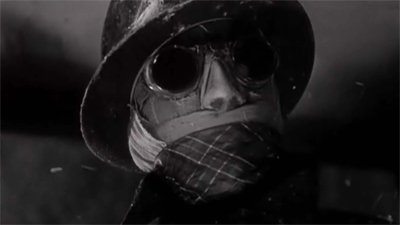
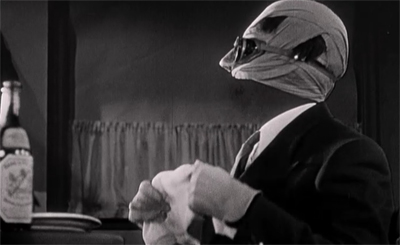
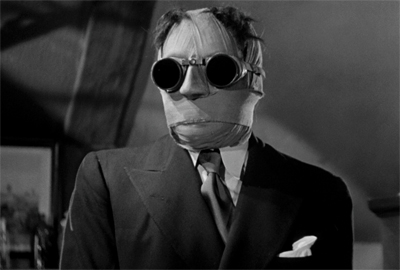
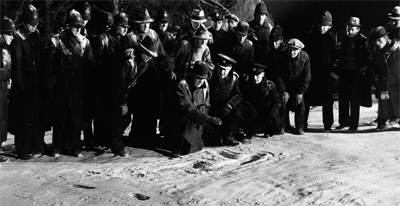

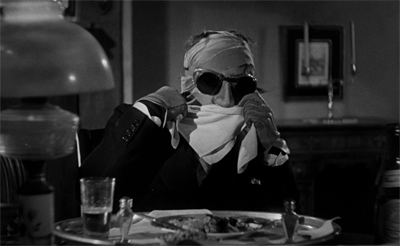
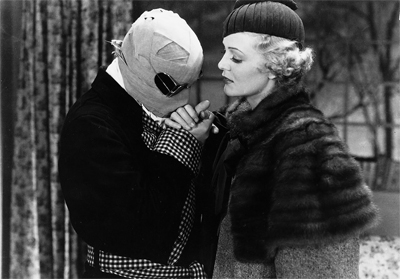
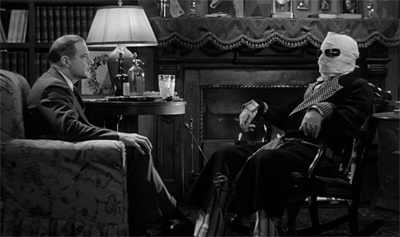
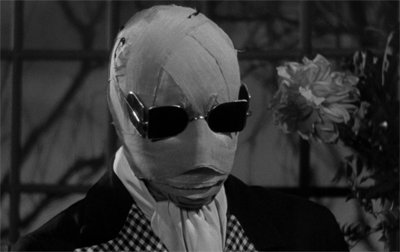


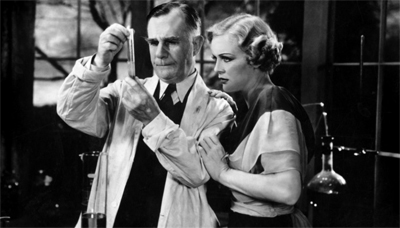
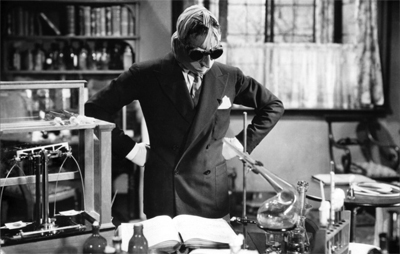
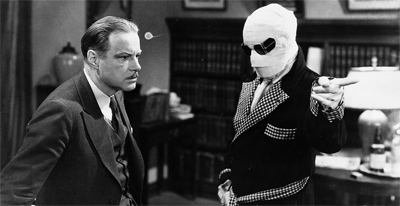
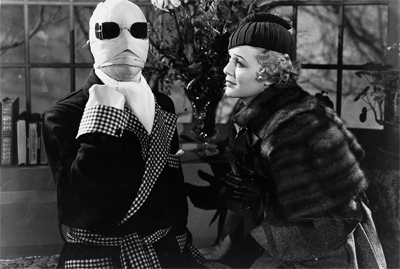





Reblogged this on Oscar's Blog.
“I’m strong, and I’ll strangle you,” became an in-joke non sequitur among my friends for a couple years after some of us refreshed our memories of this movie together.
It’s not a joke in the movie, by design or by accident, but there’s something about the delivery and its place in Griffin’s delusions… he’s not supernaturally strong, and he’s not really even threatening with the power he’s acquired over other men. He’s just telling the man he expects to become a party to serial mass murder that if he doesn’t help out, Griffin will sneak up on him and choke him to death. Ah, well then, better get cracking on all those capital crimes, eh?
The Invisible Man was the big reason why the attempt to build a contemporary “Dark Universe” trailer out of Universal’s old monster movies got a belly laugh from me. When they put rising, apocalyptic strings over Griffin’s rant about the world trembling before him, I mean… it’s scary in context, but it’s scary because he’s a loon who derailed a train and got away with it, and now he’s howling about he’s a global threat when he’s nothing of the sort. It’s scary because everything he’s saying is wrong and ridiculous and bleakly comic. But if you tell him, he’s strong, and he’ll strangle you.